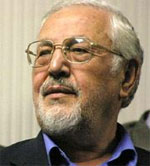Unspoken Events of the 1979 Revolution
» Interview with Ebrahim Yazdi
Rooz ®: What was the connection between the Guadeloupe Conference (1) and the Shah’s departure from Iran, and also the subsequent surrender – or cooperation – of the military with the new regime?
Ibrahim Yazdi (IY): The Shah’s trip to leave Iran had been planned before the Guadeloupe meeting and apparently there was no connection between the two.
R: Apparently? The decision to hold the meeting did not emerge in a single day. Preparations were in the making for months prior to it. Could the Shah have been unaware of what went on at the meeting? Did the events at the meeting not have an effect on his morale?
IY: The decision to hold a conference and the preparations for it are not necessarily connected with the deliberations by the participants at the forum or the final decisions. At Guadeloupe the participating countries reached an agreement on Iran. This does not mean that before the meeting the United States had one view and changed its view at the conference. If one looks at available resources such as books published by Cyrus Vance and Zbigniew Brzezinski it becomes clear that there were differences among officials from the State Department and senior National Security Council members from many months earlier regarding the continuation of the Shah’s regime. Germany, Britain and France had reached the conclusion much earlier than the United States that supporting the Shah was a waste of time.
R: What was the conclusion?
IY: During the Cold War the West and particularly the United States believed that national governments would not survive and that communists would take those countries over. At least this was the justification for opposing independent national governments in the Third World. They had the same concern regarding the Iranian revolution. Finally, when they could not contain the revolution they sought a solution in the partnership between the clerics and the military. This was because both of them were against the communists. The US believed that if the military did not confront the revolution and instead cooperated with it - which would preserve it in its form - it would be possible to enter the field after the fire of the revolution subsided. This was Heiser’s principal mission. What later happened in the Philippines was in the framework of this policy. The success of this policy depended on the cooperation between the clergy and the military. In Carter’s message to Mr. Khomeini after Guadeloupe there was a request or an offer for a meeting and discussion between the two. The clerics and the Revolution Council accepted this because they believed in the final victory of the revolution through the least costs.
R: Were the governments that participated at Guadeloupe in contact with ayatollah Khomeini? If they were, what were the channels?
IY: The French government was in contact with ayatollah Khomeini. After the Guadeloupe, the US too established contacts with the ayatollah. I had no role in the conference. Prior to it however a representative of the French president contacted me and said that the president desired to know of the opinion of the leader of the revolution about Iran directly prior to participating in the gathering.
R: Was Guadeloupe not the final shot at the Shah’s regime? Or was it the final blow to the Shah’s remaining dying morale?
IY: By that time, the Shah had already lost his morale for months. By the end of 1977, there was a discussion about the Shah’s abdication in favor of his son, rather than changing the government from Hoveyda’s hands to Amuzegar’s. I have described these events in my book, the Last Attempts in the Last Days. The participants at Guadeloupe except the US had reached the same conclusion months earlier. At the conference the US joined the others.
R: It appears that the French government began treating Mr. Khomeini as the head of the next leader of Iran. Was that a good decision? If so, why?
IY: The French government changed its attitude towards Mr. Khomeini after the huge rally in Iran on the religious days of Tasooa and Ashoora, before the victory of the revolution. This was clear in the talks between the French representative with him. I shall soon publish the details of those talks. But the short summary is that at the meeting that the representative of the French president and the French foreign minister had with Mr. Khomeini on December 31, 1978, while acknowledging the influence of Mr. Khomeini’s leadership in Iran and the French readiness to cooperate with Iran on some issues, a number of other questions were raised. For example they wanted to know the type of government that the new regime in Iran would have.
R: Is the world in a condition where another Guadeloupe could take place?
IY: Any meaningful change in Iran must come from inside the country. Democracy is not a commodity that can be exported from one country to another or imported as such. In the Foreign powers had a decisive influence in the Shah’s regime, and so a meeting of the type that was held in Guadeloupe could impact foreign policy issues. But the current regime in Iran does not have that kind of a relationship with the world. Foreign impact on Iran’s is limited. Only those policies that impact change and developments inside Iran will be effective.
—
(1) Prior to the fall of the Shah in 1979, heads of major Western powers met in Guadeloupe, a French group of islands in East Caribbean, and, as various sources indicate, agreed that supporting the Shah from then on was futile.


